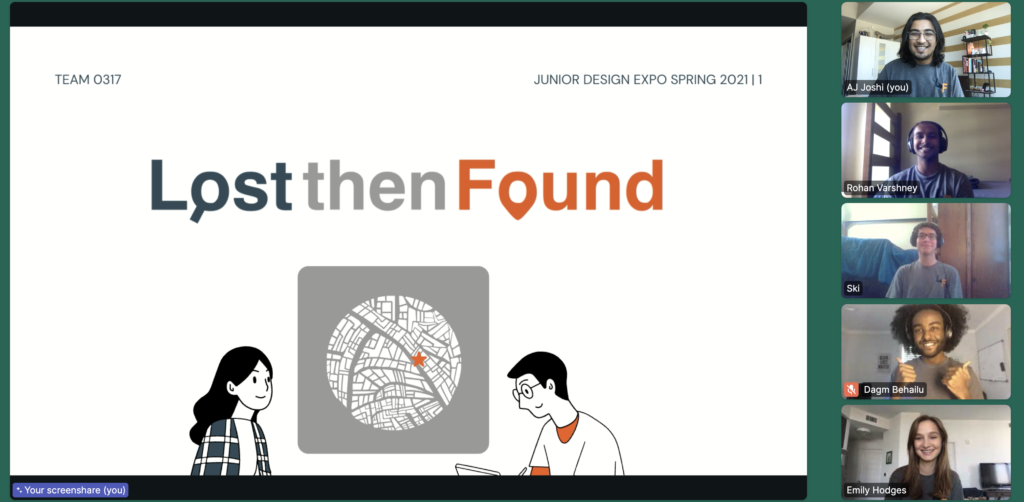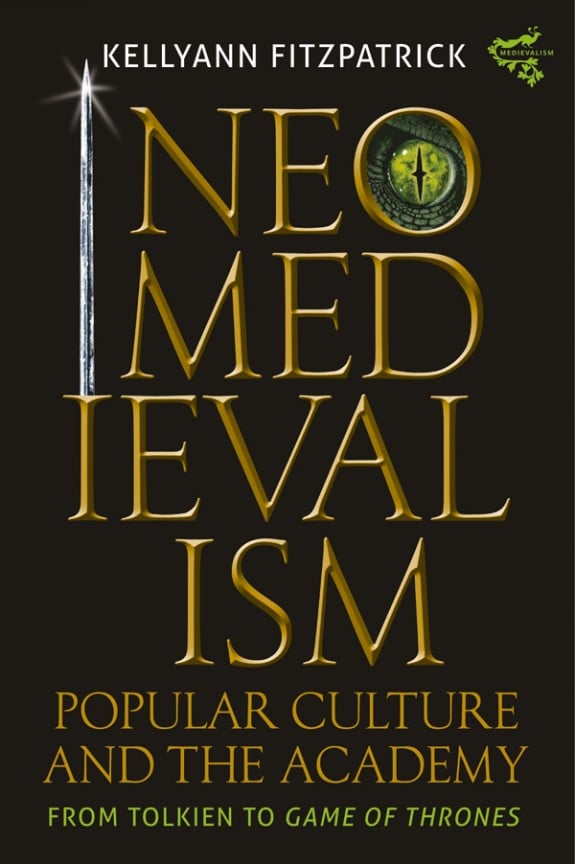 Members of Team 317, first-place winners of the Spring 2021 Computer Science Junior Design Capstone Expo, virtually present their Lost then Found app
Members of Team 317, first-place winners of the Spring 2021 Computer Science Junior Design Capstone Expo, virtually present their Lost then Found app
A few years back I wrote a series of posts–which I co-published on my RedMonk blog and on TECHStyle at Georgia Tech– about the intersections of technical communication in the tech industry and classroom. These posts drew on my experiences coordinating and teaching in Georgia Tech’s Computer Science Tech Comm Junior Design course series while also kicking off my career as a RedMonk analyst. As I wrote in the series intro, for me these posts were
a unique opportunity to contemplate the role of technical communication (“tech comm” for short) in two spaces that I have, up until now, mostly experienced in parallel: the tech industry and the university-level classroom.
While I no longer teach at Georgia Tech, I have kept in touch with a number of excellent former colleagues who still do; I have also tried to follow the progress of the course series itself. When the COVID-19 pandemic hit during the Spring 2020 semester, this meant watching my colleagues and their students navigate an abrupt move to all-online classes (which made the tech industry’s move to virtual events seem relatively frictionless). However, as Spring 2020 turned into Summer and then Fall 2020, it also meant watching my former colleagues better adapt the course series to an all-online paradigm (even while also, notably, navigating a pandemic).
One of the more complicated adaptations involved shifting the previously in-person public expo component of the course series to a virtual format. The shift required not only a virtual platform for collecting and displaying each student team’s project materials, but also one that allowed for synchronous presentations of deliverables such as elevator pitches and demos (organizers eventually chose to go with Career Fair+). Also needed: a way for virtual attendees and designated judges to evaluate each team (organizers chose Rocket Judge for this).
Based on the publicly available team project displays for the Fall 2020 and Spring 2021 expos, the shift to the virtual format appears to have worked out well. More information for these events, along with materials for prior in-person expos, are available on the Expo section of the course series landing page.
Teaching with Virtual Classrooms and Expos: a Q&A with Dr. Amanda Girard
I wanted to learn more, however, about the shift to online formats and the general evolution of the course series itself. So I checked in with Dr. Amanda Girard, who currently coordinates the course series (and who I had the good fortune to work with during my last few semesters at Georgia Tech), for an update. She was kind enough to answer the following questions for me:
Q: What were some of the challenges of both your individual courses and the course series going online?
Honestly, the amount of scaffolding required to teach an online course is much different than presenting, lecturing, or workshopping in a classroom. Discussions become discussion posts. Questions show up in the chat. And, whether teaching asynchronously or synchronously, the human connection is much different–especially when no one wants to turn their camera on.
I had taught online before the pandemic and I understood the work that went into teaching an online course. However, I remember attending the Celebrating Teaching Day event just before we went all online. I was sitting at a table of faculty who I did not know very well and I asked them if anyone had ever taught online. The overwhelming response was no. While the College of Computing has offered online classes for quite some time now, they are often recorded over a number of months before going live. The pivot to online teaching for the co-instructors in this course series was a bit daunting because we were given the week of Spring Break to get everything up and running. We found that Microsoft Teams worked well to help keep our student teams connected. It has helped to have a co-instructor on camera because teaching to a screen of faceless boxes with the name in the corner can be isolating. Overall, I think that we all did our best and found our own ways of connecting with the students. I have definitely tried to incorporate more individual meetings with the student teams.
Q: Were there any benefits to running or teaching the course series online?
Yes, I think that many of the students, like many of the instructors, were fearful of the pandemic, but still wanted to continue their educational pursuits. Computer Science and Computational Media majors were actually a great group to teach at this time because they are constantly asked to learn, try, and analyze different interfaces and technologies. Many of them will work remotely at some point in their careers and it’s beneficial to them to learn how they work well in virtual environments.
Q: What were some of the challenges of making the expo virtual?
Choosing a platform that we could easily and inexpensively access that would be easy for anyone to use was the biggest initial concern. Once a platform was chosen, making decisions about what should be required synchronously and asynchronously and revising the assignment were the next challenges. Attendance is always a challenge with virtual expos and, even when invitations get emailed, you never know who is going to attend. I’m glad that we require the students who are taking CS3311/LMC3432–the first part of the course series–to attend so that the presenting students see others who stop by their electronic booth.
Q: Were there any pros to the expo going virtual?
The virtual expo made it possible for clients who are not in Georgia to attend and engage with student teams. Further, it was easier for someone who may want to be an acting customer/client in the course series to just pop in over lunch and view some asynchronous materials. I would enjoy offering virtual access to the expo in the future.
Q: How else have you seen the course series change since you have been involved with it? Do you have any plans for the future?
There are always new changes and challenges in the course series. Most recently the required CS ethics course is being made a prerequisite to the course series. Ethical computing is of the utmost importance and understanding the importance of digital humanities when creating new technologies and we want our students to work with awareness. With this in mind, we have also started offering an Intro to Computer Law course to further detail intellectual property rights, patents, and other relevant legalities.
All in all, I was not surprised to see that the CS and CM students adapted well to virtual classroom and virtual expo experiences, as much of the course series already required some online collaboration and project management components. And to my mind this bodes well for students who plan to move into a software industry that is still trying to balance remote-first and office-based work options (and also navigate asynchronous and synchronous virtual collaboration methods).
Spring 2021 Expo Student Team Winners
57 undergraduate student teams (all finishing the second semester of the course series) participated in the expo. Their projects were judged by the first-semester students participating in the course series, with the following results:
- Team 317 took first place with their Lost Then Found app, a “A digital, community-based lost-and-found solution for college campuses”
- Team 350 took second place with their StudyFind Research Dashboard, which “provides an interactive way to search for research studies happening across the world. Filtering and visualization tools are enabled to aggregate and compare the data”
- Team 300 placed third with their Fridge app: “a pantry management app that provides a simple and efficient way to monitor one’s food waste”
The course series is almost always looking for clients and projects; client commitment and project proposal information can be found on the course series page.
Related Resources
Links to the full series of posts about the intersections of technical communication in the tech industry and classroom:
- Crossing the Streams: Technical Communication in the Tech Industry | Classroom
- Inside the Computer Science Tech Comm Classroom
- Tech Industry Events vs. Academic Conferences: Some Takeaways
- Going Public: Tech Comm and Booth Duty
- From Flying Helicopters to Teaching CS: an Interview with a Georgia Tech Instructor
- On Teaching, Tech Comm, and Fencing
- The Georgia Tech Spring 2019 CS Expo: a Recap and Interview
Disclosure: Microsoft is a RedMonk client.

No Comments